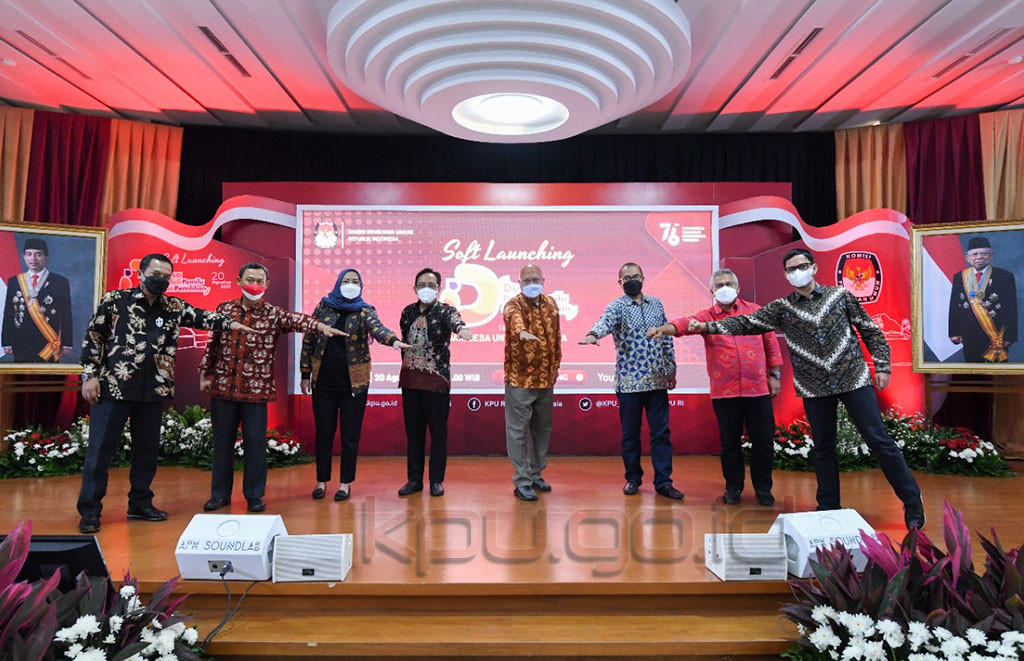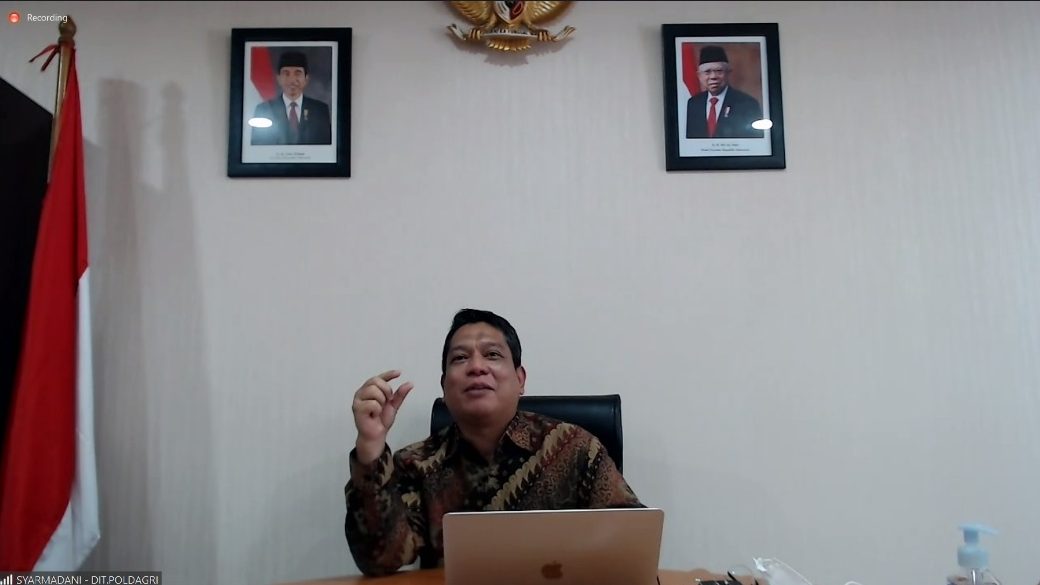
Thousands of electoral administrations in the regions will end their term of office in the middle of the 2024 simultaneous election process. An extension of the term of office is considered to be a solution.
The term of office of the thousands members of the General Election Commission (KPU) ends in the midst of preparations for the 2024 Simultaneous General Election (Pemilu) and Regional Head Elections (Pilkada). Most of them are faced with the end of their term of office which overlaps with the election stage agenda. Two years from now there are at least 1721 members who will resign, while at the beginning of 2024 there will be 1029 people.
At the provincial level, as many as 136 commissioners will expire in 2023. This number is equivalent to 71.5 percent of the total 190 provincial Election Commissioners throughout Indonesia. They come from several provinces, including the Election Commission of East Java Province, Riau, North Kalimantan, East Kalimantan, and East Nusa Tenggara. Most of them will enter the end of the task (AMJ) prior to the voting.
The expiry of the term of office at the provincial level will also be worsened by the end of the term of office of the regency/city administrator. Referring to the Commission data, the number of the Election Commission members districts/cities is currently about 2,743 people. Meanwhile, the total number of commissioners whose terms of office will expire in 2023 and 2024 is around 1,585 people. One example of organizers in 34 regencies/cities in Java ending simultaneously in June 2024. Upon entering this demissionary period, the organizers were in the middle of updating the voters’ data, the establishment of ad hoc bodies, and the early stages of nominating the regional head elections.
Meanwhile, the official of the Election Commission for the 2017-2022 period who was inaugurated by President Joko Widodo on April 11 2017 only served until April 2022. Referring to the agreement of the working team deal with Commission II of the House of Representatives (DPR), the government, and election organizers some time ago, The presidential and legislative elections were previously scheduled to be held on February 28, 2024, while the regional elections would be held on November 27, 2024. By doing so, the 2024 elections will certainly be overseen by the Election Commission for the 2022-2027 period.
Member of the Regional General Election Commission (KPUD) of East Java Province, Choirul Anam is one of the commissioners who will end his duties two days before the vote. By doing so, the change of electoral administration in East Java will take place at the stage of logistics distribution, such as ballots, ballot boxes, and election forms to districts/cities. “We ended up at peak periods of the preparations for the elections,” said Choirul to Jaring.id on Friday, August 13, 2021.
This change, according to Choirul, has the potential to disrupt election preparations. This is because the replacement process, which is usually carried out six months before the end of the term of office, often divides the concentration of Election Commission members who return to participate in the selection process. Even though at that time there were still many stages that needed to be done, starting from the registration and verification of the parties participating in the election, disputes regarding the candidate nomination, logistical preparation, campaigning, forming of an ad hoc committee, determining electoral districts to the initial stages of preparation for the elections in East Java. According to him, the continuity of the staged process at the end of all becomes important during the transition process from the transitional commission to the replacement commission.
Even so, there is no guarantee that one of the previous organizers can be re-elected to resume the unfinished election stages. While the new members of the elected Commission, he said, are not necessarily experienced conduct of elections. “When there is a change in the middle of the stage it was definitely disturbing. It is undeniable, “he said.
The chairman of the South Sulawesi Provincial election commission, Amir Faisal had already experienced how the selection process breaks his concentration when holding the stages of the South Sulawesi governor election in 2018. At the same time, he had to be faced with a written exam and a schedule for the debate of regional head candidates. “If these two interests collide, I would prefer to participate in the selection rather than participate in the stage of the regional election. Because if we don’t, we will fail,” he said in an interview on Friday, August 13, 2021.
A similar opinion was expressed by Nafila Astri. The term of office of the Surabaya City Election Commission members will end in the midst of the recapitulation and dispute over the results of the 2024 Presidential and Legislative Elections. Thus, the new organizers must immediately take over their duties, as well as prepare for a lawsuit at the Constitutional Court and re-voting. “It would be a challenge if the recruitment is carried out in the middle of the stages,” said Nafila.
The Extension Being Solution
The implementation of the 2024 election is different from later 2019. Because in upcoming 2024, the organizers must hold legislative, presidential elections and hold regional head elections simultaneously in the same year. Throughout 2023-2024, according to a member of the Indonesian Commission, Arief Budiman, there will be at least 12 AMJ (the end of the task ) waves that will coincide with important stages of the 2024 election. At that stage, the organizers must hold several open plenaries that must be attended directly, including the determination of the voter list, the determination of candidacy, recapitulation, determination of election results, and determination of campaign zones.
To ensure that organizers are available at that stage, the Indonesian Election Commission will conduct a screening which is expected to take a minimum of 3 months. “Throughout the stages of the (national and local elections) the Commission should carry out recruitment with a scattered schedule,” Arief said on Friday, August 20, 2021.
According to Arief, this recruitment process will result in the election schedule at each level of organizers becoming increasingly congested, including at the Central Commission. The organizers are also considered not to be fully concentrated through the stages. Because in line with the recruitment process, the election commission will often face lawsuits at the Election Supervisory Body (Bawaslu), the Honorary Board of Election (DKPP), including the Police. As happened in the 2019 Simultaneous Elections, according to Arief, the Election Commission had undergone a long trial regarding the recruitment process in the midst of other election problems.
Therefore, last June, the Indonesian Commission asked the Ministry of Home Affairs (Kemendagri) and the House of Representatives to extend the term of office of regional election organizers until the election day ended. Meanwhile, the Indonesian Election Commission’s term of office, which will end in April 2022, does not need to be extended. The reason, said Arief, was that the election Commission demissionary process occurred in the early stages of the election. “I hope there will be a decision soon. If approved, this proposal cannot work if the law is not revised. For revision, it will definitely take more time,” said Arief.

The Director of Domestic Politics at the Ministry of Home Affairs, Syarmadani, said that the option to extend the term of office was a rational choice. However, there needs to be a determination of criteria that can filter out troubled operators. “It is impossible for us to extending troubled people,” he said during the National Webinar on the Selection of Election Organizers in the Context of Elections and Democracy on Thursday, August 19, 2020.
a Law Maker of Commission II of the House of Representatives, Guspardi Gaus admitted that his party had not yet made a decision regarding the Commission Elections proposal. This is because the Parliament has previously agreed to issue a plan to revise the Election Law from the list of national legislation programs (Prolegnas). In previous talks, the Parliament discussed the proposal to shorten the term of office until 2022, or before the election stages begin. By doing so, it will not disturb the recruitment schedule and local elections. “It has not been decided which alternative will be taken,” said Guspardi when interviewed on Thursday, August 19, 2021.
Until recently, this politician from the National Mandate Party (F-PAN) faction assessed that the change of organizers in the middle of the stages would not interfere with the election stage. Because the Elections Commission is an institution that has a working system and mechanism, so the replacement process should not affect the course of the stages. “We do not depend on the personal. If it is decided to be replaced it should be replaced. The Commission has no reason stated doubtful, “he said.
Meanwhile, researcher of the Jakarta-based Network for Democracy and Electoral Integrity (Netgrit) Hadar Nafis Gumay assessed that the change of organizers in the middle of the stages was not an ideal design for the implementation of elections. The process of changing the organizers should be in line with the cycle of election stages. “This is not just a formal legal exercise, but how a group of commissioners can work in a team from the start. Not working together at the end,” he said on Monday, August 16, 2021.
Hadar assessed that the unsynchronized election schedule with the organizers’ tenure was the impact of merging all elections at one time. It’s just that when making this decision, both the government and the Parliament failed to rearrange the organizers’ term of office. In order to make the cycle of change of organizers in line with the election period, Hadar suggested extending the term of office of the organizers until the 2024 election is over. By doing so, the Commission can conduct simultaneous recruitment for one election cycle at least 2 years before the election took place in 2029. “It needs to be regulated through an election law or a presidential regulation in lieu of law,” he said. (Debora Blandina Sinambela)







